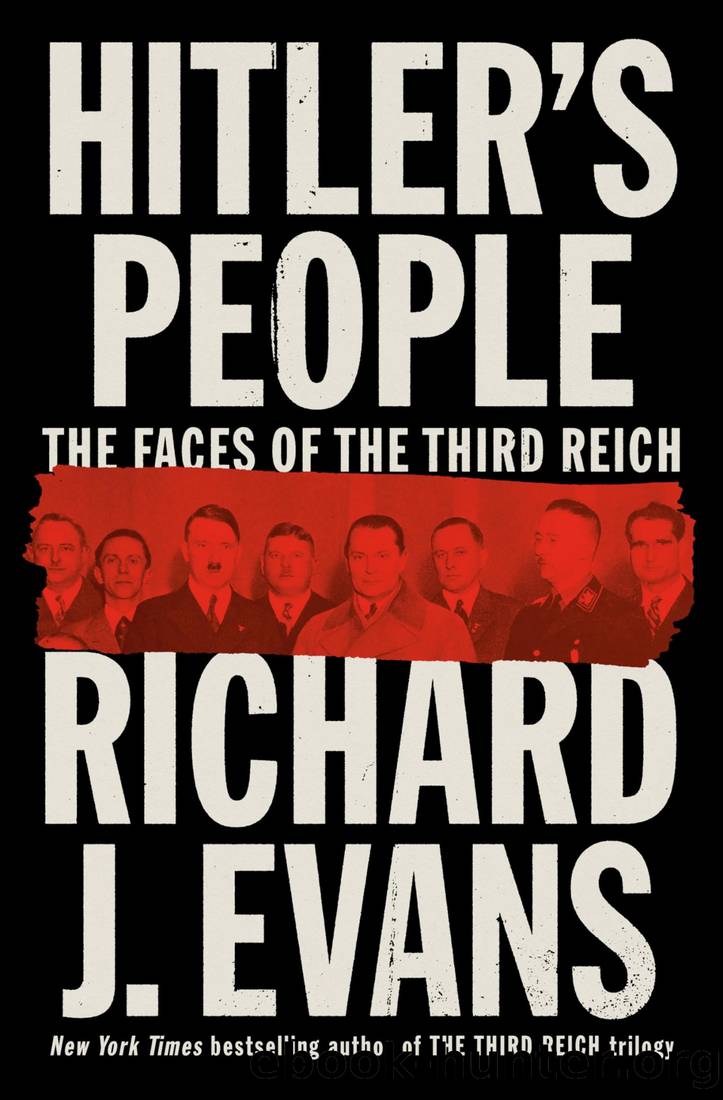Hitler's People: The Faces of the Third Reich by Richard J Evans

Author:Richard J Evans [Evans, Richard J]
Language: eng
Format: epub
Tags: Biography & Autobiography, Historical, History, Wars & Conflicts, World War II, General, Political
ISBN: 9780593296424
Google: YOfiEAAAQBAJ
Amazon: 0593296427
Publisher: Penguin
Published: 2024-08-13T00:00:00+00:00
Heydrichâs search for power and recognition ultimately led him to order the deaths of millions, but even this was pursued within the boundaries of a policy ordained by his superiors.
14
The Bureaucrat: Adolf Eichmann
From 11 April 1961, when it began, to 15 December 1961, when it ended, the trial of Adolf Eichmann gripped viewers across the globe. Broadcast from the courtroom in Jerusalem on radio and television, reported on by legions of journalists, recounted at length in newspapers and magazines, it presented moving and harrowing testimony from some 112 surviving victims of the Holocaust, men and women who had been through the ghettos and camps and seen sadism and brutality almost beyond imagining, witnessing mass murder on a scale that almost defied comprehension. The Eichmann trial was perhaps the first occasion in which the full horror and extent of the Holocaust had been broadcast to the whole world. The defendant became notorious as the man who, more than any other, had orchestrated and organized the killing. And yet, at the end of the war, Adolf Eichmann had scarcely been known to the general public at all. Noticing his name on a draft of the judgement issued by the International Military Tribunal at Nuremberg shortly after the war, one of the judges, Francis Biddle, had scrawled next to it the words: âwho was he?â[1] Eichmann featured only incidentally in the early histories of the Nazi regime or the Holocaust.[2] He lacked entirely the kind of notoriety accorded to Himmler or Heydrich. His name cropped up in many documents, but it was always in the background, never in the glare of publicity. Even at his trial, he presented himself above all as a bureaucrat, a transportation and emigration executive, a man who never fired a shot in anger or murdered anyone with his own hands. âI had nothing to do with killing Jews,â he told his interrogator in Jerusalem. âIâve never killed a Jew. And Iâve never ordered anyone to kill a Jew.â[3] The prosecution portrayed him as a new kind of killer, âthe kind that exercises his bloody craft behind a deskâ.[4] But this did not satisfy the media. Early, journalistic biographies, rushed out before the trial had even begun, argued, along the lines of other studies of Nazis at the time, that he was psychologically damaged, sexually perverted, violent and depraved. They failed to convince.[5] Nor was the prosecuting attorneyâs claim that he had a âSatanic personalityâ in any way persuasive.[6]
Download
This site does not store any files on its server. We only index and link to content provided by other sites. Please contact the content providers to delete copyright contents if any and email us, we'll remove relevant links or contents immediately.
| France | Germany |
| Great Britain | Greece |
| Italy | Rome |
| Russia | Spain & Portugal |
Fanny Burney by Claire Harman(26602)
Empire of the Sikhs by Patwant Singh(23084)
Out of India by Michael Foss(16853)
Leonardo da Vinci by Walter Isaacson(13336)
Small Great Things by Jodi Picoult(7137)
The Six Wives Of Henry VIII (WOMEN IN HISTORY) by Fraser Antonia(5514)
The Wind in My Hair by Masih Alinejad(5095)
A Higher Loyalty: Truth, Lies, and Leadership by James Comey(4959)
The Crown by Robert Lacey(4814)
The Lonely City by Olivia Laing(4801)
Millionaire: The Philanderer, Gambler, and Duelist Who Invented Modern Finance by Janet Gleeson(4478)
The Iron Duke by The Iron Duke(4354)
Papillon (English) by Henri Charrière(4273)
Sticky Fingers by Joe Hagan(4197)
Joan of Arc by Mary Gordon(4109)
Alive: The Story of the Andes Survivors by Piers Paul Read(4031)
Stalin by Stephen Kotkin(3965)
Aleister Crowley: The Biography by Tobias Churton(3640)
Ants Among Elephants by Sujatha Gidla(3467)
